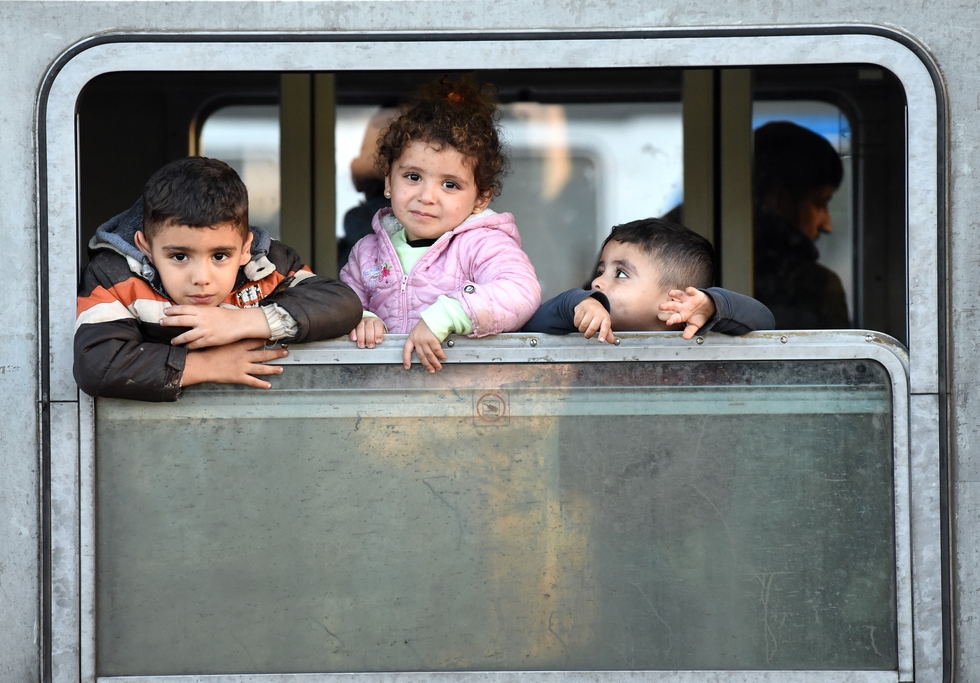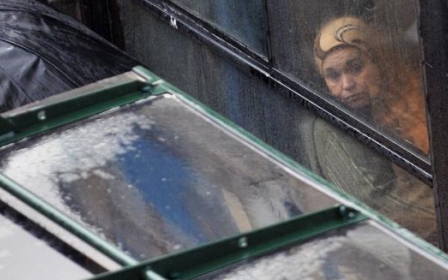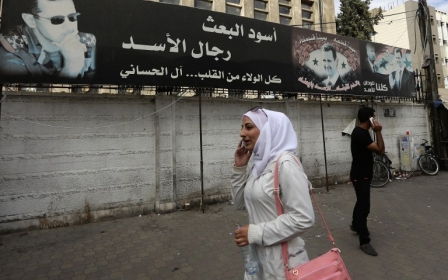ANALYSIS: Is the refugee crisis making a war crimes indictment on Syria more likely?

Chemical attacks, barrel bombs, hundreds of thousands dead, and whole cities levelled. The war in Syria has brought untold misery to millions of people, many of who have been displaced either internally or abroad.
There have long been calls in the West to try and make someone accountable for the crisis, and namely to trial Syrian President Bashar al-Assad for war crimes. But while some leaders have suggested that Assad must face justice, and the French have recently opened a probe into the allegations against the embattled leader, thus far there has been little tangible progress. That now might be about to change.
According to former State Department war crimes ambassador-at-large Stephen Rapp, the refugee crisis sparked by the brutal more than four-year-conflict may be bolstering the likelihood of a future war crimes prosecution against Bashar al-Assad.
“National authorities need to have jurisdiction to launch a prosecution,” Rapp told The Daily Telegraph, earlier this month. “With the refugee crisis, that avenue has been broadened from where it was even a few months ago.”
Legal convention stipulates that in order to have domestic jurisdiction to try someone for serious crimes, a state must demonstrate a national interest for opening a prosecution.
Rapp believes that the refugee crisis – which has sent millions of refugees fleeing into neighbouring Middle East countries as well as increasingly to Europe - is establishing that.
Rapp could not be reached for comment, but other legal experts and human rights researchers interviewed by Middle East Eye have backed up the claim, saying that there is a link between a possible future indictment against government officials and the ongoing refugee crisis. However, the reality is rather more complex than it might seem.
Hugo Relva, a legal adviser to Amnesty International’s International Justice team in Argentina, described Rapp’s comments as “logical” because they referred to the concept in international law of universal jurisdiction. This means that states “can exercise jurisdiction when a crime has been committed abroad by a foreigner and the victims are also non-nationals of the concerned state”.
Advocacy Director at Human Rights Watch’s International Justice Program, Geraldine Mattioli-Zeltner, told Middle East Eye that the crimes in Syria - often described in terms of war crimes, crimes against humanity and torture - would allow European states to exercise universal jurisdiction, although some conditions remain.
"Usually a state will prosecute a crime if there’s a strong link with that state,” she said, while, explaining that the traditional methods for claiming jurisdiction would be if the crime had taken place in that state, or the victim or perpetrator was a national of that state.
Most states nowadays enforce a condition that a perpetrator of serious crimes must be present in their territory in order for them to be tried in court. That rules out Assad and other key government officials for now.
In September, France launched a criminal inquiry into the Assad government on allegations of crimes against humanity, including kidnappings and acts of torture, committed between 2011 and 2013.
French Foreign Minister Laurent Fabius said in a statement following the announcement that “faced with these crimes that offend the human conscience, this bureaucracy of horror, faced with this denial of the values of humanity, it is our responsibility to act against the impunity of the killers”.
But many accept that procedural snags will beset such an inquiry. Mattioli-Zeltner says that media reports suggesting that France is going after Assad are “inaccurate”.
Geoff Gilbert, a law professor at the University of Essex who specialises in international criminal law and the protection of refugees and displaced persons, told Middle East Eye: “You’ve got to get him out of Syria.”
“So, is someone going to extradite him? Unlikely. Assume [Assad] leaves Syria and goes somewhere else. Well, actually, he is a president, a head of state…so he can’t be prosecuted in front of the domestic court of any other country. He’s got immunity – complete and utter [immunity].”
Serbian President Slobodan Milosevic was extradited to the International Criminal Tribunal for the former Yugoslavia, to be tried for war crimes, after he stood down from power in 2000. A warrant for the arrest of General Augusto Pinochet, issued by Spanish prosecutors who sought to have him extradited during a visit to the UK, also took place after Pinochet was no longer the head of state of Chile.
As such, at the moment, the most likely indictments to go ahead would be if European states found that perpetrators of war crimes, crimes against humanity or torture in Syria had actually left Syria and joined the migration flows in Europe.
If European states find such people on their territory, they can open a prosecution. Although there is the possibility that these cases could climb up the chain of command, through the principle of command responsibility for example, the problem remains that the high-ranking perpetrators may still be in Syria.
Various Twitter accounts, including @EU_MilitiaWatch, claim to be documenting the passage of regime shabeeha or Shia militia “war criminals” - but not other actors, like the Free Syrian Army or Jabhat al-Nusra, who may also have committed serious crimes in the Syrian crisis - towards popular destination countries like Germany and Sweden. An anonymous admin of the account told MEE that they are communicating with the European authorities to try to bring alleged war criminals to justice.
But the issues run deeper. “It’s important to recall that all parties to the conflict are committing crimes…so all of them should be investigated and, if there is admissible evidence, prosecuted, by civilian courts everywhere,” said Amnesty’s Relva.
Caesar: ‘Torturing to kill’
Any future prosecution against the Syrian government would likely rely heavily on a cache of 50,000 images smuggled out of Syria by a former photographer for the Syrian military police - a man known only as “Caesar.” Until now, this is the largest extant body of evidence of abuses by the Assad government and its allied forces.
Speaking to French journalist Garance le Caisne, in an article published in The Guardian on 1 October, Caesar appeared to remember his job before the revolution as mundane, not much like hard work. He would go to photograph bodies from crime scenes or accidents, “suicides, for example, or drownings; traffic accidents or house fires”. He would do this maybe two or three times a week, then he would write a report and go home.
However, once anti-government protests spread out in March 2011, bodies started to arrive in bigger numbers. The injuries were different, too. The bodies would be dumped at Tishreen and Mezzeh, two military hospitals in the Syrian capital that would be transformed into morgues and torture chambers, physical monuments to the bloody repression meted out by the government.
“I had never seen anything like it,” Caesar told Caisne. “Before the uprising, the regime tortured prisoners to get information; now they were torturing to kill.”
“I saw marks left by burning candles, and once the round mark of a stove - the sort you use to heat tea - that had burned someone’s face and hair. Some people had deep cuts, some had their eyes gouged out, their teeth broken - you could see traces of lashes with those cables you use to start cars.
After copying and backing up photographs for two years, Caesar fled Syria armed with 50,000 images. He now living in France, in fear of his life, under iron-clad security measures.
Bodies have begun to be identified from the photographs.
Ahmad, a Syrian teacher living in Cairo who asked for his real name to be withheld, told MEE that he identified the body of a close friend from the photos.
“We found one of our friends in the photos. We didn’t know what had happened to him, but then we saw him when the photos were released.”
Ahmad’s friends agreed not to tell the parents of the deceased friend, but word eventually got out. The parents then wanted to see the photograph.
“His body was so thin, lying there with his mouth open,” Ahmad said. “Ah, we’re used to it now.”
Families and friends of some of the thousands of deceased pictured in Caesar’s photos are said to be cooperating with prosecutors. But this just one new avenue that has opened up to prosecutors.
The refugee crisis: New possibilities?
In fact, the refugee crisis could now be bolstering this body of evidence and creating new possibilities in the process.
“For a long time it was very hard for war crimes units in Europe to have access to these victims when they were in camps in Turkey or Lebanon or Jordan, or wherever they were,” explains HRW’s Mattioli-Zeltner. “[But] now it’s more likely that people who may have been in detention in torture centres in Syria, or who have suffered other human rights violations, are in a safe place where they can talk to the police.”
“Prosecutors can now collect this kind of evidence in a safe way and in a way that was not available [to them] earlier,” she said, adding that countries are now able to collect evidence. “That would make it possible to prosecute Assad once he is not the president of the country anymore…or top-level officials in the Syrian government, once they are not in Syria anymore - if they defect and leave, for example.”
As more and more refugees cross into Europe, away from war and instability and towards safer, lives, they too are bringing with them witness testimonies and possible evidence of abuses.
New MEE newsletter: Jerusalem Dispatch
Sign up to get the latest insights and analysis on Israel-Palestine, alongside Turkey Unpacked and other MEE newsletters
Middle East Eye delivers independent and unrivalled coverage and analysis of the Middle East, North Africa and beyond. To learn more about republishing this content and the associated fees, please fill out this form. More about MEE can be found here.




